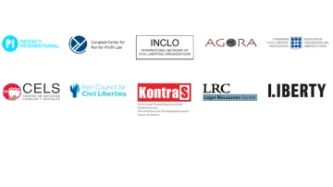Search
Content type: Advocacy
Privacy International (PI) notes the Bureau’s text of the WHO convention, agreement or other international instrument on pandemic prevention, preparedness and response (“WHO CA+”).
PI has sought to closely follow and engage with the discussions leading up to the draft treaty, despite the significant limitations to civil society participation in the process. In February 2023, we intervened during the briefing organised by the INB bureau and published our comments on the zero draft of the WHO CA…
Content type: Advocacy
Background
In August 2022, Amazon announced that they had entered into a definitive merger agreement to acquire iRobot, a company that specialises in designing and building consumer robots. The transaction was formally notified to the European Commission on 1 June 2023, while the UK Competition and Markets Authority (CMA) has already launched an investigation into the transaction since April 2023.
We believe that this acquisition is likely to significantly impede effective competition in and…
Content type: Long Read
In 2022, Privacy International continued to produce real change by challenging governments and corporations that use data and technology to exploit us. And, we produced substantial impact that directly affects each of us.
Here are a handful of our biggest achievements in 2022.
WE CHALLENGED COMPANIES TO CHANGE THEIR BUSINESS MODELS AND PRACTICES
Regulators in UK, France, Greece, and Italy fined and restricted Clearview AI’s activity
Clearview AI built a massive database of our biometrics, by…
Content type: Advocacy
This joint submission to the European Commission consultation on security-related information sharing was signed by Border Violence Monitoring Network (BVMN), Statewatch, Euromed Rights, European Digital Rights (EDRi), Access Now, Privacy International (PI), Refugee Law Lab (York University), Homo Digitalis and the Platform for International Cooperation on Undocumented Migrants (PICUM). Signatures were subsequently added from European Network Against Racism (ENAR), Dr Derya Özkul and Dr Niovi…
Content type: Long Read
The final report on the 2022 Kenyan election is the result of a collaboration with the Carter Center as part of a joint pre-election assessment focussing on the use of technology in the run up to and during the Kenyan election which took place 9 August. The final report, published this month, follows our preliminary statement of September 2022.
Below we set out a few key observations in connection with the use of data and technology, as well as some of the key data protection incidents.
Key…
Content type: Video
In January 2023, the UK's Investigatory Powers Tribunal handed down a landmark judgment. The Tribunal held that there were “very serious failings” at the highest levels of MI5 - the UK's domestic intelligence agency - to comply with privacy safeguards from as early as 2014, and that successive Home Secretaries did not to enquire into or resolve these long-standing rule-breaking despite obvious red flags.
In this episode, we talk to Meg Goulding, a lawyer at the UK-based campaigning…
Content type: Examples
In a report, the Center for Democracy and Technology finds that student privacy laws are insufficient to protect students in the face of increasing use of remote education technologies and insufficient staff and other resources. CDT examined the practices of 43 local education authorities and their relationships with their state education agencies in order to understand what information is transparently and proactively available to families, staff, and other stakeholders.
https://cdt.org/…
Content type: Advocacy
The submission provides PI’s information and analysis of some of the topics listed in the call. The widespread use of new technologies presents both opportunities and challenges for the protection of human rights, including the right to life and the right to privacy. PI believes that is essential that states take a human rights-centered approach in their use of these technologies, and ensure that their use is consistent with international human rights law. By doing so, states can ensure that…
Content type: Advocacy
Privacy International (PI) welcomes the zero draft of the WHO convention, agreement or other international instrument on pandemic prevention, preparedness and response (“WHO CA+”). PI has sought to closely follow and engage with the discussions leading up to the draft treaty, despite the significant limitations to civil society participation in the process.
PI believes that the zero draft offers a good basis for negotiations. In particular, we welcome the inclusion of a provision on…
Content type: Case Study
This piece was written by Privacy International, based on publicly available information and on research by our partners at Hiperderecho
Overview
The Documento Nacional de Identidad (DNI) is the personal ID card recognised by the Peruvian State in any situation where a person might have to identify themselves, be it in an administrative, judicial, civil, or commercial context. The DNI also grants its holder the right to vote.
The DNI issuing and overseeing body is the Registro Nacional de…
Content type: Advocacy
Privacy International (PI), the European Center for Not-for-Profit Law (ECNL), International Network of Civil Liberties Organizations (INCLO), Agora, the Canadian Civil Liberties Association, Centro de Estudios Legales y Sociales in Argentina, the Irish Council for Civil Liberties, KontraS in Indonesia, the Legal Resources Center in South Africa, and Liberty in the UK welcome the opportunity to provide input to the global study of the UN Special Rapporteur on the promotion and protection of…
Content type: News & Analysis
Our mobile phones contain all kinds of data that ranges from photos, videos and emails to information about our health, the places we visit and our leisure time. This data is often relied upon by law enforcement authorities in criminal investigations.
Mobile phone extraction (MPE) tools are used for this purpose as they enable police and other authorities to download content and associated data from people’s phones. These tools are supplied by private companies to security forces and…
Content type: Long Read
In August 2021, PI published the report An unhealthy diet of targeted ads where we uncovered how personal data was shared by diet companies through their online ads and online testing. Our findings were quite grim, with highly sensitive personal data shared with third parties without consent.
Following this initial report, we performed follow-up research with the same methodology and by September 2021 we reported a number of positive changes from two of these websites: BetterMe and VShred.…
Content type: Long Read
We won our case against the UK’s Security Service (MI5) and the Secretary of State for the Home Department (SSHD). The Investigatory Powers Tribunal (IPT) – the judicial body responsible for monitoring UK’s intelligence and security agencies – held that MI5 acted unlawfully by knowingly holding people’s personal data in systems that were in breach of core legal requirements. MI5 unlawfully retained huge amounts of personal data between 2014 and 2019. During that period, and as a result of these…
Content type: Press release
In a landmark judgment, handed down today (Monday 30 January 2023), the Investigatory Powers Tribunal have found that there were “very serious failings” at the highest levels of MI5 to comply with privacy safeguards from as early as 2014, and that successive Home Secretaries did not to enquire into or resolve these long-standing rule-breaking despite obvious red flags.Human rights organisations Liberty and Privacy International, who brought this significant legal case in January 2020, have…
Content type: Long Read
On 18th January, it was announced that end-to-end encrypted iCloud services, Advanced Data Protection, would be offered to Apple users globally.The offer of such level of security globally, while overdue, is a key step to ensuring trust and confidence in today’s world. There are too many threats to our data and our rights. Twelve years ago, we called on Apple to encrypt iCloud storage for users all around the world.Why this is importantWhile privacy and security is often portrayed as opposite…
Content type: News & Analysis
We have been fighting for transparency and stronger regulation of the use of IMSI catchers by law enforcement in the UK since 2016. The UK police forces have been very secretive about the use of IMSI catchers – maintaining a strict “neither confirm nor deny” (NCND) policy. In our efforts to seek greater clarity we wrote to the UK body which monitors the use of covert investigatory powers, the Investigatory Powers Commissioner’s Office (IPCO), asking the Commissioner to revisit this…
Content type: Explainer
What protections might VPNs offer?
Adds an extra layer of encryption between your device and the VPN exit, hiding the content and metadata of your traffic, and true destination of your Internet browsing, from your internet service provider (ISP)
Hides your device’s IP address from websites & apps by routing your traffic via a third country, which can bypass country-based blocks
What don’t they offer?
Won’t hide your phone’s presence from IMSI catchers
Doesn’t protect against…
Content type: Long Read
The UK’s security services have the power to collect, analyse, and store huge amounts of personal data. They can target specific individuals, hack their computers, and intercept their data or communications, but they can also obtain personal datasets in bulk, intercept overseas communications in bulk, and collect huge swathes of communications data from telecomms providers.[1]
The public rightly expects that the vast amounts of personal data which agencies like MI5 collect and store will be…
Content type: Report
In the months following the beginning of the Covid-19 pandemic, more than half the world’s countries enacted emergency measures. With these measures came an increase in executive powers, a suspension of the rule of law, and an upsurge in security protocols – with subsequent impacts on fundamental human rights. Within this broader context, we have seen a rapid and unprecedented scaling up of governments’ use of technologies to enable widespread surveillance. Surveillance technologies exacerbated…
Content type: Explainer
What is SMS
SMS - or Short Messaging Service - refers to the widespread messaging service that virtually any of us will be familiar with. This refers to the first form of texting available on mobile phones, which makes use of cellular phone service - not to be confused with more modern instant messaging services making use of the internet instead (iMessage, Whatsapp, Signal ...). This explainer aims to give an overview of the technology, and some of its limitations in today's context and after…
Content type: Long Read
The defense and protection of the environment continues to come at a high cost for activists and human rights defenders. In 2021, the murders of environment and land defenders hit a record high. This year, a report by Global Witness found that more than 1,700 environmental activists have been murdered in the past decade.
While the issue of surveillance of human rights defenders has received attention, evidence of the surveillance of environmental activists keeps mounting, with recent examples…
Content type: Long Read
Last update: 26 April 2023
In 2022, Privacy International continues to produce real change by challenging governments and corporations that use data and technology to exploit us.
We know life moves quickly. So, we wanted to keep you in the loop and ensure you don’t miss out on how we’re changing the world for the better.
That’s why we’ve created this highlight reel of our wins in the past year.
Take a look below!
PS: To continue to do this, and more, into 2023, we need your support. We…
Content type: Advocacy
The European Union Artificial Intelligence Act (AI Act) will regulate the development and use of ‘high-risk’ AI, and aims to promote the uptake of ‘trustworthy AI’ whilst protecting the rights of people affected by AI systems.
However, in its original proposal, the EU AI Act does not adequately address and prevent the harms stemming from the use of AI in the migration context. Whilst states and institutions often promote AI in terms of benefits for wider society, for marginalised communities,…
Content type: Long Read
In the UK, successive government ministers and members of parliament have made emotive proclamations about the malaise of "public sector fraud".
This year, former Work and Pensions Secretary Therese Coffey said that the welfare system "is not a cash machine for callous criminals and it’s vital that the government ensures money is well spent...[and] fraud is an ever-present threat."
In 2013, the UK's minister for the disabled made numerous claims that there were "vast numbers of bogus disabled […
Content type: News & Analysis
In a judgment of 14 October 2022, the UK High Court ordered the UK Home Office to provide remedy to the thousands of migrants affected by its unlawful policy and practice of seizing mobile phones from people arriving by small boats to UK shores.
The availability and spread of new technologies, and the exponential amounts of data they generate, are regularly being abused by governments to surveil and control people - but these new forms of surveillance are only starting to make their way through…
Content type: Long Read
Introduction
India’s educational system is the largest in the world, with over 250 million students, 50% of whom attend publicly administered schools.
The autonomy given by the Indian Constitution to the 28 states and 8 union territories means that the right to education is implemented quite differently in each one, respecting culture, language, and other local specificities. Educational policies are suggested at the national level by various autonomous agencies and states can implement them in…
Content type: Examples
Ohio teenager Aaron Ogletree has won a lawsuit he filed against Cleveland State University after he was required to pan a webcam around his bedroom to eliminate possible cheating before taking a remote exam.
The court agreed that Ogletree's Fourth Amendment rights were violated by the scanning requirement, which briefly exposed tax documents and medications. The university has filed an appeal and in the meantime has told students that they will not be permitted to take remotely proctored…
Content type: Examples
In a 2010 case, the Lower Merion school district in suburban Philadelphia school district agreed to pay $610,000 to settle two lawsuits brought by students who had discovered that the webcams attached to their school-issued laptops had secretly taken hundreds of photographs of them in their homes along with hundreds of screen shots. In one of the cases, a teenaged boy was accused of popping pills; in fact, he was eating jelly beans.
https://www.wired.com/2010/10/webcam-spy-settlement/
Writer…
Content type: Examples
Even though schools are back in session in person, their teachers can still monitor the screens on their school-issued devices via software such as GoGuardian. In a new report from the Center for Democracy and Technology, 89% of teachers say their schools will continue to use student-monitoring software, up from 84% in 2021, raising worries about how the data will be used in a climate increasingly hostile towards abortion and LGBTQ+ issues.
CDT also reports that 44% of teachers say that at…






















